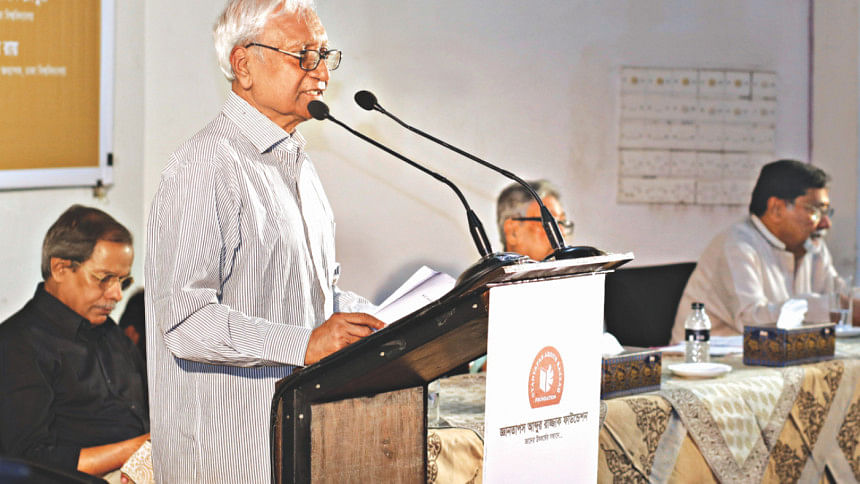We must break free from existing system

The failure to implement communist ideologies in the societal system has shaped the course of this subcontinent for the worse, Professor Emeritus of Dhaka University Serajul Islam Choudhury observed yesterday.
In addition, the rise of capitalism has brought the world -- and as its part, Bangladesh -- to a difficult juncture, he added.
The preeminent scholar and author made the observations while delivering a lecture on “Nation and Class: Thoughts and Concerns on Bangladesh and the Subcontinent” in Muzaffar Ahmed Chowdhury Auditorium of DU Social Science Faculty building.
Gyantapas Abdur Razzaq Foundation organised the fifth episode of its ongoing lecture series titled, “Gyantapas Abdur Razzaq Distinguished Lecture”.
An over-capacity audience -- consisting largely of students -- crammed into the auditorium to soak in the wisdom and insights. Some of them stood at the back while some sat on the floor in front of and behind the podium.
Dr Ajoy Roy, an eminent educationist and former teacher of DU, chaired the session. Dr Ahrar Ahmad, director general of Gyantapas Abdur Razzaq Foundation, delivered the welcome address.
Professor Syed Manzoorul Islam introduced the speaker through a brief speech.
In his lecture, Prof Serajul said, “When Bangladesh was established, there was a hope that people will be free. But that did not happen. Initiatives were taken to make the economy communism-focused and a strong planning commission was also formed.”
“Its members did extensive research but their recommendations were not accepted, and the commission itself disintegrated,” he said.
He attributed it to a lack of political interest in bringing about a new system, and an interest in establishing the capitalist system.
“There are four perspectives on the question of nation and class in the subcontinent and Bangladesh. They are nationalist, liberal, religious fundamentalist and socialist,” Prof Serajul asserted.
“Although there are major differences between them on the surface, a closer inspection reveals that the first three have something in common. They all believe in capitalism.”
Delving into historical nuances of the socio-political landscape of the subcontinent, Prof Serajul explained how at various points in the process of the birth of India and Pakistan, liberals and nationalists have had their limitations in forgoing the concept of personal ownership and embracing the establishment of communal ownership.
The nearly two-hour lecture branched out into various aspects of political history of the subcontinent, including the emergence of India and Pakistan, and eventually Bangladesh. “Subhash Chandra Bose was out and out a Bangalee. He came into politics under the leadership of Chittaranjan Das, who tried to keep the politics of Bengal separate from the politics of India. But his untimely demise put a brake on that,” Prof Serajul said.
“Subhas Bose eventually practised Indian politics. If he could have kept the two separate, the history of the Partition could have been different,” he added.
Prof Serajul said the class division question must be solved. “In undivided Bengal, we could not solve the nationalist equation of 52 percent Muslims and 48 percent non-Muslims; in Pakistan it became 56 percent Bangalees and 44 percent non-Bangalees, and now in Bangladesh it is 20 percent beneficiaries and 80 percent deprived.”
To solve this, he said, “We must break this societal system; not to create anarchy, but to liberate creativity and create equal opportunities and rights for all, and to create a new world of communal ownership.”
“The fundamental failure to launch pro-people politics that will dismantle the class system has brought us at a crossroads, and it will only get worse,” Prof Serajul said.
He concluded by saying that nationalists have given all they could, and what needs to be done now, must be done by communists.

 For all latest news, follow The Daily Star's Google News channel.
For all latest news, follow The Daily Star's Google News channel. 



Comments